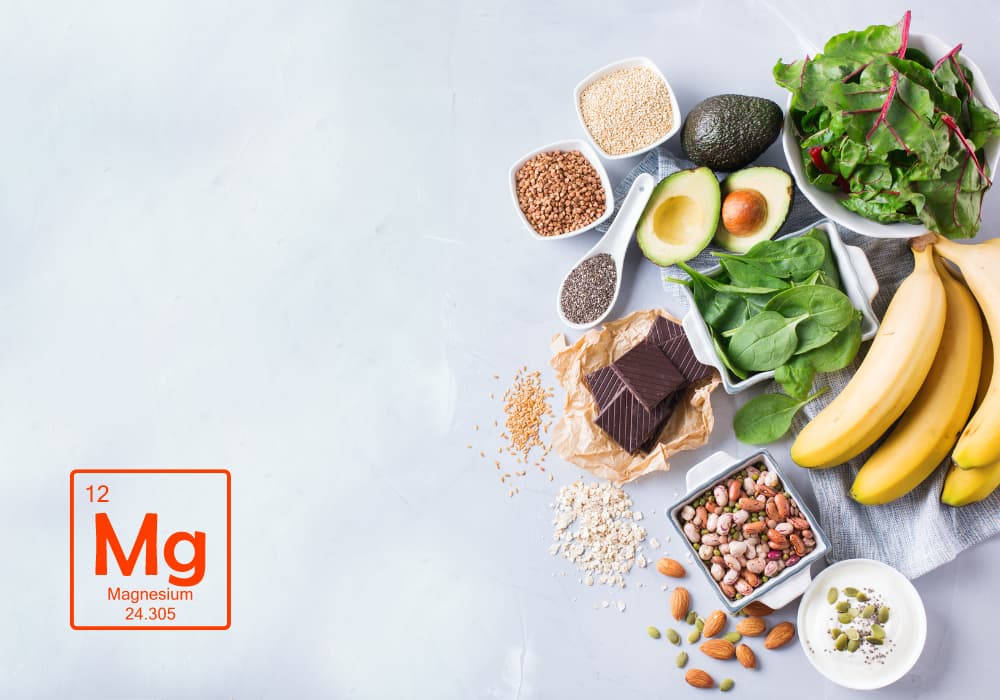
Categories
Why Is Magnesium Deficiency a Problem For Fat Loss?
Magnesium is a vital mineral essential for numerous bodily functions, including weight management. Understanding how magnesium deficiency can hinder fat loss is vital to optimising diet and health.
Magnesium in Weight Management
Magnesium is involved in over 300 biochemical reactions in the body, influencing muscle and nerve function, blood glucose control, and energy production. These processes are integral to maintaining a healthy weight and promoting fat loss.
- Carbohydrate Metabolism
Magnesium is essential for carbohydrate metabolism. A deficiency can exacerbate insulin resistance, a condition closely linked to obesity. Proper magnesium levels help in efficient carbohydrate metabolism, reducing the risk of weight gain.
- Sleep Quality
Magnesium significantly impacts sleep quality, which is crucial for weight loss. Poor sleep is associated with weight gain, while magnesium can promote better sleep by calming the nervous system and relaxing muscles.
Causes of Magnesium Deficiency
Several factors contribute to widespread magnesium deficiency:
- Poor Soil Quality
Modern agricultural practices have depleted magnesium levels in the soil, leading to lower magnesium content in food.
- Acidic Diets and Lifestyles
An acidic diet and lifestyle can deplete magnesium, as this alkaline mineral neutralises excess acidity in the body.
Addressing Magnesium Deficiency
To combat magnesium deficiency, consider these steps:
- Magnesium-Rich Foods
Incorporate organic, magnesium-rich foods such as spinach, almonds, cashews, pumpkin seeds, black beans, avocados, and yoghurt.
- Quality Magnesium Supplements
Many magnesium supplements on the market are made from magnesium oxide, which is less effective. Opt for supplements ending in ‘ate,’ such as magnesium glycinate, for better absorption and efficacy.
Magnesium and Weight Loss
- Insulin Sensitivity
Magnesium improves insulin sensitivity, helping to regulate blood sugar levels and reduce fat storage. Enhanced insulin sensitivity is crucial for weight loss, as it allows the body to efficiently use glucose for energy rather than storing it as fat.
- Reducing Inflammation
Magnesium has anti-inflammatory properties, which can help reduce the chronic inflammation associated with obesity and metabolic syndrome.
- Diuretic Effect
Magnesium can act as a diuretic, reducing water retention and bloating, contributing to a leaner appearance, and potentially aiding in weight loss.
Increasing Magnesium Intake
Increased magnesium intake is associated with lower BMI, waist circumference, and blood sugar levels. Research also indicates magnesium supplementation can help manage insulin and glucose levels, further supporting weight loss efforts. To ensure adequate magnesium intake:
- Diet
Consume a variety of magnesium-rich foods daily. Aim to include leafy greens, nuts, seeds, fish, and whole grains in your diet.
Vegetables
- Spinach: 1 cup cooked contains approximately 157 mg of magnesium.
- Swiss Chard: 1 cup cooked provides around 150 mg.
- Kale: 1 cup cooked contains about 38 mg.
Nuts and Seeds
- Pumpkin Seeds: 1 ounce (about 85 kernels) has 150 mg.
- Almonds: 1 ounce (about 23 almonds) provides 80 mg.
- Cashews: 1 ounce (about 18 cashews) contains 82 mg.
- Chia Seeds: 1 ounce (about 2 tablespoons) contains 95 mg.
- Flaxseeds: 1 ounce (about 2 tablespoons) contains 111 mg.
Legumes
- Black Beans: 1 cup cooked contains 120 mg.
- Kidney Beans: 1 cup cooked has around 74 mg.
- Lentils: 1 cup cooked provides about 71 mg.
Whole Grains
- Quinoa: 1 cup cooked contains 118 mg.
- Brown Rice: 1 cup cooked provides 86 mg.
- Oats: 1 cup cooked contains about 57 mg.
Fish
- Salmon: 3 ounces cooked contains 26 mg.
- Mackerel: 3 ounces cooked provides about 82 mg.
- Halibut: 3 ounces cooked has around 90 mg.
Fruits
- Avocado: 1 medium-sized fruit provides 58 mg.
- Banana: 1 medium-sized banana contains 32 mg.
- Figs: 1 cup dried contains 101 mg.
Dairy Products
- Yogurt: 1 cup contains 47 mg.
- Milk: 1 cup contains around 24-27 mg, depending on fat content.
Other Sources
- Dark Chocolate: 1 ounce (70-85% cocoa) contains 64 mg.
- Tofu: 1 cup provides about 80 mg.
Magnesium deficiency can significantly hinder fat loss by impacting carbohydrate metabolism, insulin sensitivity, and sleep quality. Addressing this deficiency through diet and supplements is essential for effective weight management and overall health.
We help our members with a nutritional programme that works for them; if you’re struggling, give us a shout at one of our group training gyms in London, and we’ll help you work out a plan that suits you.
You may also find our nutritional e-books helpful to eating healthier.
Related Articles
- A Different Take on Fat Loss
- Are More Expensive Supplements Worth It?
- Strength Training Through Menopause
- Is Porridge Good for You
- 5 Hydration Strategies for Optimal Performance in the Gym


